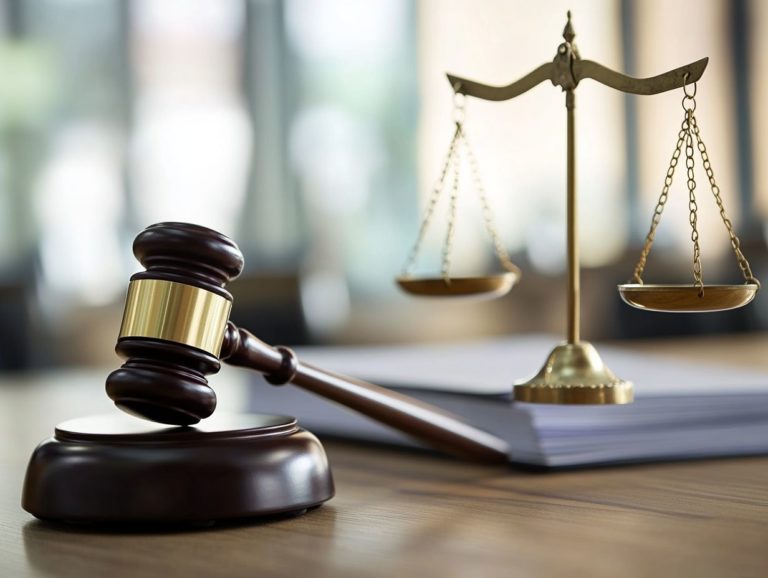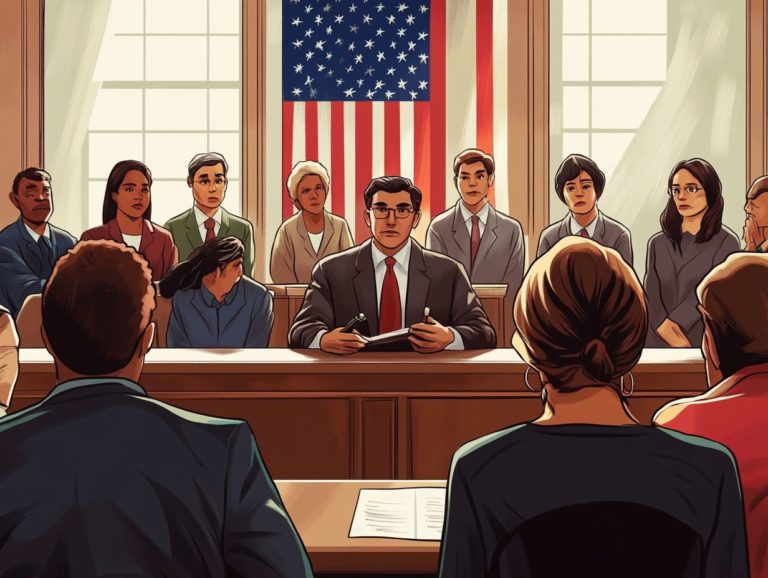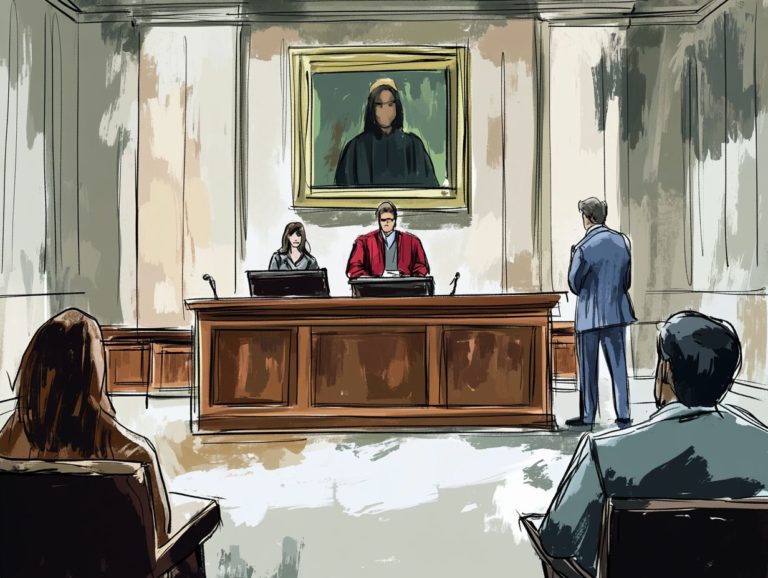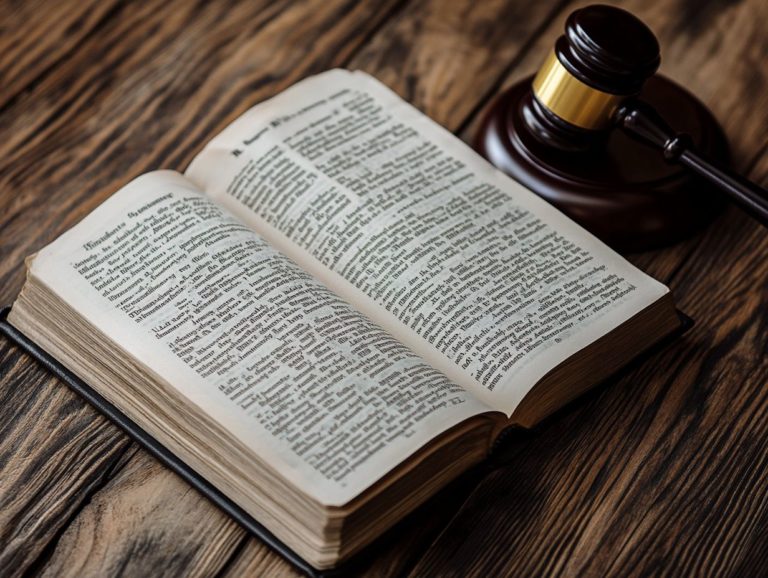Your Rights During Plea Bargaining
Plea bargaining is an important part of the criminal justice system. It offers a way to resolve your case more efficiently.
Understanding what plea bargaining means is just the first step. You need to know your rights, like having an attorney and the option to reject a plea deal.
Before you accept a plea agreement, take the time to understand the evidence against you and consider the potential consequences of going to trial.
Effective communication with your attorney is not just helpful; it s essential. Equip yourself with the knowledge necessary to make informed decisions throughout the plea bargaining process.
Contents
- Key Takeaways:
- Understanding Plea Bargaining
- Your Rights During Plea Bargaining
- Factors to Consider Before Accepting a Plea Deal
- How to Effectively Navigate Plea Bargaining
- Frequently Asked Questions
- What is plea bargaining?
- Do I have the right to refuse a plea bargain?
- What are my rights during the plea bargaining process?
- Can I change my plea after agreeing to a plea bargain?
- What if I feel pressured to accept a plea bargain?
- What happens if the prosecution does not honor the terms of the plea bargain?
Key Takeaways:
- You have the right to an attorney during plea bargaining.
- You have the right to know the charges and evidence against you.
- Consider the strength of the evidence and the potential consequences of trial before accepting a plea deal.

Understanding Plea Bargaining
Plea bargaining is a negotiation process between you, the defendant, and the prosecution.
You might agree to plead guilty to a lesser charge to secure a lighter sentence or even have other charges dismissed. This practice not only reduces the burden on the courts but also helps you avoid the unpredictability of a jury trial, which could lead to a longer prison sentence if you were found guilty of the original charges.
Definition and Purpose
A plea bargain is when you agree to plead guilty to a lesser charge in exchange for reduced sentencing or other benefits.
This practice is vital in the legal system, as it streamlines court proceedings and conserves valuable judicial resources. For prosecutors, it means more efficient case resolution and the assurance of securing a conviction without the unpredictability of trial outcomes.
As a defendant, you can benefit from potentially lighter penalties while avoiding the lengthy and often stressful trial process. While a plea bargain might limit your options for appealing a sentence, it offers a level of certainty about the consequences of your actions.
This negotiation creates a balanced justice system that addresses the needs of both parties involved.
Your Rights During Plea Bargaining
During plea bargaining, you must be fully aware of your rights in pre-trial procedures. This includes your right to an attorney, your right to be informed about the charges and evidence against you, and your right to reject any plea deal proposed by the prosecution.
Right to an Attorney
The right to an attorney is a fundamental constitutional right. It ensures you have legal representation during plea bargaining and throughout the criminal process. This support helps you navigate the complex legal landscape with clarity and expert guidance.
A skilled trial lawyer is crucial in analyzing the charges against you, explaining the potential consequences of various plea options, and highlighting the strengths and weaknesses of your case.
For example, if your lawyer identifies that the evidence against you is weak, they might advise you to pursue a trial rather than accept a plea deal. Conversely, if the risks are significant, they can negotiate for better terms, ultimately guiding you toward outcomes that align with your best interests.
Right to Know Charges and Evidence

You have the right to know the specific criminal charges that are being brought against you, as well as the evidence the prosecution intends to present in court. This transparency is essential for you to make an informed decision about whether to accept a plea bargain.
With this information in hand, you can thoroughly assess the strengths and weaknesses of the prosecution s case. This enables your legal representation to craft an effective strategy. Understanding the details of your case allows you to weigh the risks of going to trial against the potential benefits of a plea agreement.
In many situations, this clarity can lead to reduced charges or lesser sentences, significantly influencing your future and legal standing. Thus, being fully informed is not merely advantageous; it is absolutely crucial for successfully navigating the complexities of the legal system.
Right to Reject a Plea Deal
The right to reject a plea deal gives you the power to refuse any offered agreement and instead choose to proceed to a jury trial, firmly asserting your right to contest the charges in court. This fundamental right holds significant weight in the realm of plea bargaining, where the stakes are high and your decisions can lead to drastically different outcomes.
By opting to go to trial, you may aim to clear your name and evade the potentially serious consequences due to accepting a plea. This choice carries risks; the uncertainty of a trial verdict could result in harsher penalties than those presented in a plea deal.
Consider a scenario where you face a minor drug charge. The plea offer might appear appealing, yet you could opt for a trial if you believe the evidence against you is tenuous or if you want to contest the moral implications of your case.
The decision to reject a deal is not made lightly; it reflects a careful balancing act between potential benefits and the unknowns that the courtroom presents.
Factors to Consider Before Accepting a Plea Deal
Before you accept a plea deal, it’s essential to meticulously consider several critical factors:
- The strength of the evidence stacked against you
- The potential effects of proceeding to trial
- The possible advantages that come with accepting a plea deal, such as reduced charges or a more lenient sentence during the hearing
Strength of Evidence
The strength of the evidence against you is a pivotal factor that can significantly sway your decision regarding a plea deal. Strong evidence may increase the likelihood of conviction should your case go to trial.
To gauge the robustness of the prosecution’s case, you ll likely work closely with your legal counsel, who can meticulously analyze the various facets of the evidence presented. Important considerations include the credibility of witnesses, the reliability of forensic evidence, and the overarching context of your case.
For example, if the prosecution leans on circumstantial evidence think vague witness statements or inconclusive forensic tests it might indicate a shaky case. This scenario could pave the way for plea negotiations, giving you the opportunity to secure more favorable terms.
When you identify weaknesses in the evidence, such as inconsistencies in witness accounts or a lack of physical proof, you may find yourself in a strong negotiating position. This could result in leniency in sentencing or even reduced charges, ultimately benefiting your situation.
Potential Consequences of Trial
You must consider the potential consequences of facing a trial, which could lead to severe prison sentencing, especially if a jury finds you guilty after a lengthy legal process.
Beyond these outcomes, you should also weigh the emotional toll that a drawn-out trial can impose on you and your loved ones, often resulting in anxiety and prolonged distress.
The specter of a hung jury looms large, creating an unsettling uncertainty that could lead to retrials and further complications.
Additionally, the financial burden of legal fees can escalate dramatically, draining resources that could have been better allocated elsewhere.
As the legal battle continues, the fear of conviction can weigh heavily on many, along with the cascading repercussions that ripple through their lives well beyond the courtroom.
Possible Benefits of Accepting a Plea Deal

Accepting a plea deal can present you with several advantages, such as the opportunity to negotiate lesser charges. This could potentially lead to reduced penalties or even eligibility for programs that could expunge your criminal record.
This strategic choice often allows for a quicker resolution of your case, saving valuable time and resources for everyone involved. By reducing the seriousness of the charges, you can sidestep the long-term repercussions typically associated with felonies, such as challenges in securing employment, housing, or loans.
For example, many jurisdictions provide diversion programs that might involve counseling or community service requirements. Successfully completing these programs can prevent a conviction from tarnishing your record.
These initiatives not only aid in rehabilitation but also equip you with vital life skills that facilitate your reintegration into society.
To successfully navigate plea bargaining, communicate effectively with your attorney while cultivating a clear understanding of the negotiation strategies at your disposal.
This knowledge will empower you to secure the most favorable plea agreement possible.
Communication with Your Attorney
Open and honest communication with your trial lawyer is vital during the plea bargaining process; your attorney s expertise can illuminate the implications of various plea agreements for you.
Establishing trust and transparency creates a collaborative environment where you can voice your concerns freely. When you feel comfortable sharing your thoughts and emotions, it allows your attorney to tailor strategies that best fit your unique situation.
When they engage in active listening and ask open-ended questions, it encourages deeper dialogue. This enables them to gather crucial information that could influence the outcome of your case.
Regular updates on your case s progress help maintain that transparency, reassuring you that your interests are being prioritized.
This symbiotic relationship is invaluable, empowering both you and your attorney to navigate negotiations more effectively, ultimately leading to better plea outcomes.
Negotiating for a Better Deal
You should actively engage in negotiating for a better deal, as plea bargaining can often be a fluid process that opens the door to more favorable prosecution agreements with the right approach and strategy.
Effective negotiation techniques in this realm require a sharp sense of timing, enabling you to seize opportunities when the prosecution might be more open to compromise. By grasping the motivations behind the prosecution’s stance, you can tailor your arguments to address their specific concerns, whether it’s about resource limitations or the potential for lengthy trials.
Leveraging your unique circumstances such as your personal background or any demonstrated rehabilitation efforts can significantly sway the odds in your favor for a more advantageous plea deal.
In the end, being well-informed and prepared is essential for navigating this delicate phase of the judicial process. Act now to make sure you get the best possible outcome during plea negotiations!
Frequently Asked Questions
What is plea bargaining?

Plea bargaining is a negotiation process between the defendant and prosecutor in a criminal case, where the defendant agrees to plead guilty in exchange for a lesser charge or a reduced sentence.
Do I have the right to refuse a plea bargain?
Yes, as a defendant, you have the right to refuse a plea bargain and proceed with a trial. However, it is important to consult with your lawyer before making a decision.
What are my rights during the plea bargaining process?
You have the right to have an attorney present during the plea bargaining process. Your attorney will advise you on the potential consequences of accepting a plea bargain and will help you negotiate the best possible deal.
Can I change my plea after agreeing to a plea bargain?
Once a plea bargain has been accepted and entered into the court records, it is difficult to change your plea. Therefore, it is crucial to carefully consider all the aspects of a plea bargain before agreeing to it.
What if I feel pressured to accept a plea bargain?
If you feel pressured to accept a plea bargain, tell your lawyer. They can help you explore your options.
What happens if the prosecution does not honor the terms of the plea bargain?
If the prosecution does not fulfill the plea bargain, you can withdraw your plea and go to trial. Your lawyer will guide you and protect your rights.






